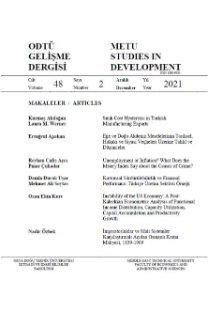What Can Keynes Tell Us About Policies to Reduce Unemployment and Financial Instability in a Globalised International Economy?
Keynes Bize Küreselleşmiş Uluslararası Ekonomide İşsizliği ve İstikrarsızlığı Azaltma Politikaları Üzerine Neler Söyleyebilir?
___
- COMISIÓN ESPECIAL DE LA CÁMARA DE DIPUTADOS, REPÚBLICA ARGENTINA (2005), Fuga de Divisas en la Argentina: Informe Final, Comisión Latinoamérica de Ciencias Sociales (CLACSO) and Siglo XXI, Buenos Aires.
- FLEMING, J. M. (1962), “Domestic Financial Policies under Fixed and under Floating Exchange Rates”, IMF Staff Papers, 9, 369-79.
- HARCOURT, G.C. (1971), Some Cambridge Controversies in the Theory of Capital, Cambridge: Cambridge University Press.
- KEYNES, J.M. (1919), The Economic Consequences of the Peace, London: Macmillan. ————(1922), A Revision of the Treaty, London: Macmillan. ————(1923), A Tract on Monetary Reform, London: Macmillan. ————(1930), A Treatise on Money, Volume II, The Applied Theory of Money, London: Macmillan.
- KREGEL, J. (1999), “Alternative to the Brazilian Crisis”, Revista de Economia Política - Brazilian Journal of Political Economy, 19, (3) (75) julho-setembro, 23-38. ————(2008), “Keynes, Globalisation and ‘National Policy Space’” forthcoming in a book edited by J. Sicsú, C. Vidotto and J. Saboia commemorating the 70th Anniversary of the General Theory, to be published by Editora Campus-Elsevier.
- MUNDELL, R. (1962), “The Appropriate Use of Monetary and Fiscal Policy under Fixed Exchange Rates”, IMF Staff Papers, 9, 70-9.
- NURKSE, R. (1953), Problems of Capital Formation in Underdeveloped Countries. New York: Oxford University Press.
- REINERT, E. (2007), How Rich Countries Got Rich...and Why Poor Countries Stay Poor. London: Constable & Robinson.
- SINGER, H. W. (1964), International Development: Growth and Change, New York: McGraw-Hill.
- SKIDELSKY, R. (2007), Luncheon Address to the Center for Full Employment and Price Stability Conference for the 70th Anniversary of the publication of the General Theory.
- SUMMERS, L. (1998), “Deputy Secretary Summers’ Remarks before the International Monetary Fund”, Washington D.C.: US Government Press Release, 2286, March 9.
- TONVERONACHI, M. (2006), “The Role of Foreign Banks in Emerging Countries – The Case of Argentina, 1993-2000”, Investigación Económica, LXV, (255), enero-marzo.
- UNITED NATIONS CONFERENCE ON TRADE AND DEVELOPMENT (UNCTAD) (1998) “Anatomy of the crises in the post-Bretton Woods period”, Trade and Development Report, 1998, Geneva and New York: Sales No. E.98.II.D.10. Chapter III, section B, 54-8.
- VINER, J. (1947), “International Finance in the Postwar World”, Journal of Political Economy, 55 (April), 97-107.
- WILLIAMS, J. and WILLIAMS, F. (2007), “Does Ownership Explain Bank Mergers and Acquisitions? The Case of Domestic Banks and Foreign Banks in Brazil”, in P. Arestis and L. F. de Paula (eds.), Financial Liberalisation and Economic Performance in Emerging Countries, Basingstoke: Palgrave Macmillan.
- ISSN: 1010-9935
- Yayın Aralığı: 3
- Başlangıç: 2018
- Yayıncı: ODTÜ İİBF
Keynes and Modern Macroeconomics
Whay Keynes' a Treatise on Money Might Have Greater Relevance Today than his General Theory?
Managing Financial Instability in Emerging Markets: A Keynesian Perspective
Neither New Nor Keynesian: A Critique of the New Keynesian Programme
Whay Keynes' a Treatise on Money Might Have Greater Relevance Today than his General Theory?
Keynesian and Neoclassical Closures in an Agent-Based Context
